

I Hate Math! Why Students Struggle. Why Do People Struggle With Math? Year after year, responses to the annual Gallup Youth Survey reveal that teenagers list math as the subject in which they encounter the most difficulty.
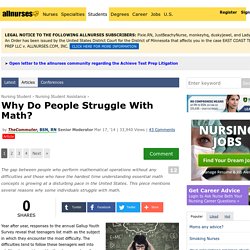
The difficulties tend to follow these teenagers well into adulthood, as evidenced by the sheer number of developmental and remedial math class offerings at colleges and universities across the US. According to Lopukhova (2012), mathematics was the most common remedial course reported by beginning post-secondary students: 15% of students in all types of educational institutions were enrolled in remedial mathematics in 2004. And statistics are dismally worse at junior colleges, partly as a result of open admissions policies that allow anyone to enroll without regard to ability to successfully handle collegiate level coursework.
Why Do Students Struggle With Mathematics. A major component of the child-centered, systematic teaching approach is content.
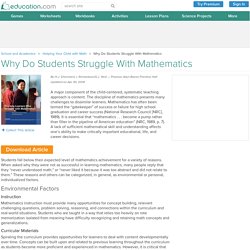
The discipline of mathematics presents many challenges to dissimilar learners. Mathematics has often been termed the “gatekeeper” of success or failure for high school graduation and career success (National Research Council [NRC], 1989). It is essential that “mathematics . . . become a pump rather than filter in the pipeline of American education” (NRC, 1989, p. 7). A lack of sufficient mathematical skill and understanding affects one’s ability to make critically important educational, life, and career decisions. Students fall below their expected level of mathematics achievement for a variety of reasons.
Environmental Factors Instruction Mathematics instruction must provide many opportunities for concept building, relevant challenging questions, problem solving, reasoning, and connections within the curriculum and real-world situations. Curricular Materials The Gap Between Learner and Subject Matter. Math Anxiety Test. Rate your answers from 1 to 5; add them up and check your score below. (1) = Disagree, (5) = Agree.
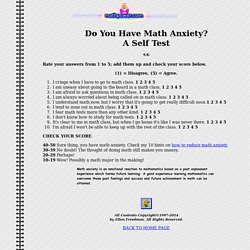
The Causes and Prevention of Math Anxiety. Etd. Math Deficits: Why Do Students Struggle? Students struggle in math for a variety of reasons.
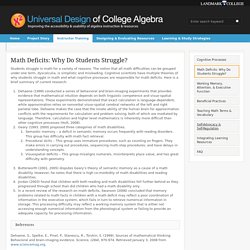
The notion that all math difficulties can be grouped under one term, dyscalculia, is simplistic and misleading. Cognitive scientists have multiple theories of why students struggle in math and what cognitive processes are responsible for math deficits. Here is a brief summary of current research: Dehaene (1999) conducted a series of behavioral and brain-imaging experiments that provides evidence that mathematical intuition depends on both linguistic competence and visuo-spatial representations. These experiments demonstrated that exact calculation is language-dependent, while approximation relies on nonverbal visuo-spatial cerebral networks of the left and right parietal lobe. References Dehaene, S., Spelke, E., Pinel, P., Stanescu, R., Tsivkin, S. (1999).
Holt, J. (2008, March 3). Ives, B. and Hoy, C. (2003). Geary, D.C. (1993). Geary, D.C. (2000). Study: Math Teachers of Struggling Students Likely to Use Ineffective Methods. Students who struggle early on with basic reading and math skills may continue to have a hard time as they progress through school.

But many early grade teachers with students struggling in math appear to be more likely to use ineffective teaching methods, according to a new study. The study – funded by the Department of Education and the National Institutes of Health – found first-grade teachers with a higher percentage of students with math difficulties in their classrooms were more likely to use student-centered instructional methods (such as the use of calculators, or movement and music to learn math) that have not been associated with achievement gains.
Those students who struggle are more likely to benefit from teacher-driven instruction, in which the teacher models problems, provides explicit instruction and gives the students many opportunities to practice, says Paul Morgan, an associate professor of education at Pennsylvania State University, and a co-author of the study. Math and Science Tutoring in Toronto. We all know that large classrooms, too little extra help from teachers, schoolyard bullying and intense pressure for high marks can all negatively impact school performance.
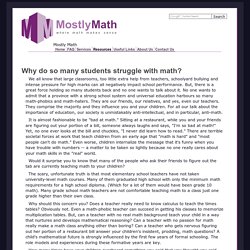
But, there is a great force holding so many students back and no one wants to talk about it. No one wants to admit that a province with a strong school system and universal education harbours so many math-phobics and math-haters. They are our friends, our relatives, and yes, even our teachers. They comprise the majority and they influence you and your children. For all our talk about the importance of education, our society is unmistakably anti-intellectual, and in particular, anti-math. It is almost fashionable to be "bad at math. " Would it surprise you to know that many of the people who ask their friends to figure out the tab are currently teaching math to your children?
The scary, unfortunate truth is that most elementary school teachers have not taken university-level math courses. Why should this concern you? Misunderstood Minds . Math Difficulties. What Can Stand in the Way of a Student's Mathematical Development?
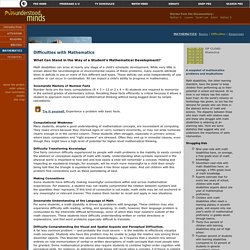
Math disabilities can arise at nearly any stage of a child's scholastic development. While very little is known about the neurobiological or environmental causes of these problems, many experts attribute them to deficits in one or more of five different skill types. These deficits can exist independently of one another or can occur in combination.